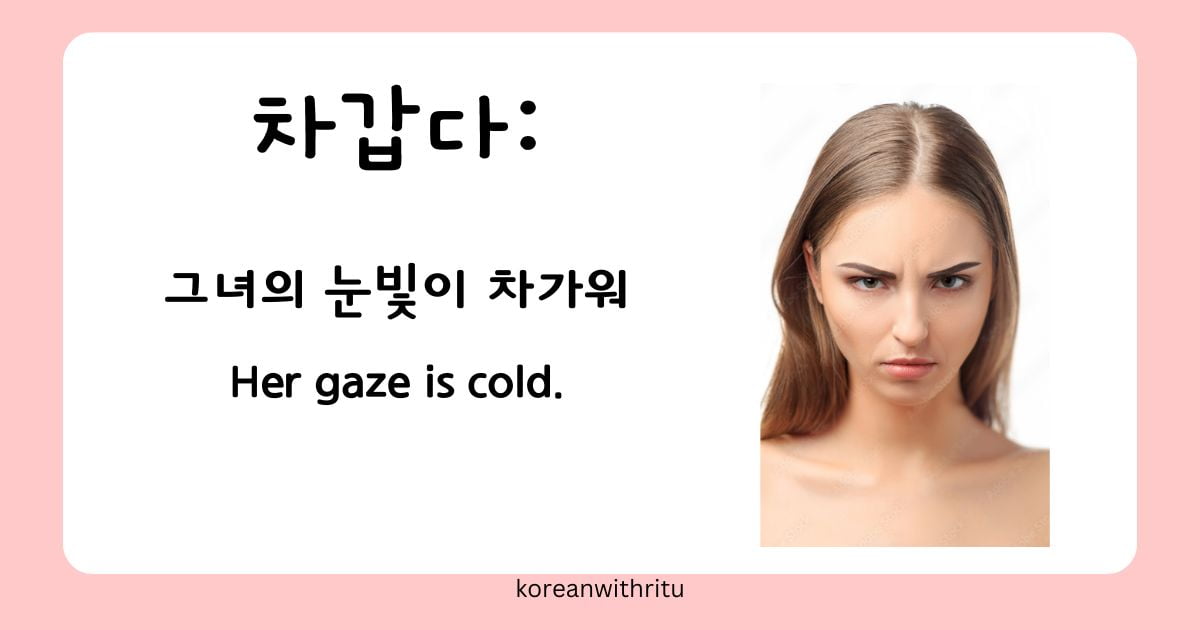Let’s take a look at the main differences between 춥다 and 차갑다 in detail. 춥다 and 차갑다 two words which are defined as being cold in the Korean language. Despite having the same meaning, are not the same. First of all, 춥다 is used to describe the coldness in terms of temperature while 차갑다 is usually used to describe something being cold to touch.
Differences In Meaning:
You can see the basic difference between 춥다 and 차갑다 through their meanings.
춥다-
춥다 [chup-ta] 춥다 means “cold” in terms of temperature.
차갑다-
차갑다 [cha-gap-ta] refers to something being “chilly” or “cold to touch,” like a cold object or a cold breeze.
Differences In Usage:
춥다 and 차갑다 show contrasting usages from one another. Let’s take a look at these differences between 춥다 and 차갑다. A tip is to try to learn their differences in usage through their examples.

춥다-
춥다 is commonly used to describe the weather or environment’s overall temperature(coldness).
Ex: 오늘은 날씨가 추워요.
[oneureun nalshi-ga chuwoyo.]
Today the weather is cold.
차갑다-
차갑다 has more than one usage. Now let’s look at all of them to be able to use them correctly and understand the word to its core. There are three main ways of using 차갑다.
Usage 1:
차갑다 is used to express the feeling or sensation of coldness on something you touch i.e. when you touch an ice cube, you feel your hand in contact with it getting cold.
Ex: 얼음이 차가워.
[oereumeun chagawo.]
The ice cube is cold. (to touch)
Usage 2:

It is also used to describe the cold, distant, or aloof nature of one’s personality. Let’s say one of your classmates doesn’t talk much with other students and often appears reserved, unresponsive, or indifferent to others’ feelings or concerns, leading others to perceive them as being unapproachable. You can describe such a personality using the word 차갑다.
Ex: 민수 씨의 태도는 항상 차가워서 다가가기 어려워요.
[Minsu shi-eui taedoneun hangsang chagawoseo dagagagi-ga eoryeowoyo.]
Minsu’s attitude is always cold, making it hard to approach him.
Usage 3:

차갑다 is also used to describe someone’s features when their physical appearance gives off a cold or stern impression.
Ex: 민수의 눈빛은 차가워 보였어요.
[Minsu-eui nunbicheun chagawo boyeosseoyo.]
Minsu’s gaze seemed cold.
The main differences between 춥다 and 차갑다 are given below in the form of table:
| Difference | 춥다 [chup-ta] | 차갑다 [cha-gap-ta] |
|---|---|---|
| Definition | 춥다 means “cold” in terms of temperature. | 차갑다 refers to something being “chilly” or “cold to touch” like a cold object or a cold breeze. |
| Usage 1 | 춥다is commonly used to describe the weather or environment's overall temperature(coldness). Ex: 오늘은 날씨가 추워요. [oneureun nalshi-ga chuwoyo.] Today the weather is cold. | 차갑다 is used to express the feeling or sensation of coldness on something you touch i.e. when you touch an ice cube, you feel your hand in contact with it getting cold. Ex: 얼음이 차가워. [oereumeun chagawo.] The ice cube is cold. (to touch) |
| Usage 2 | It’s generally only used to describe the coldness of the weather, unlike 차갑다 with more than one use. | It is also used to describe the cold, distant, or aloof nature of a person’s personality. Ex: 민수 씨의 태도는 항상 차가워서 다가가기 어려워요. [Minsu shi-eui taedoneun hangsang chagawoseo dagagagi-ga eoryeowoyo.] Minsu’s attitude is always cold, making it hard to approach him. |
| Usage 3 | It’s generally only used to describe the coldness of the weather, unlike 차갑다 with more than one use. | It is also used to describe someone’s features when it’s giving off a cold or stern impression. Ex: 민수의 눈빛은 차가워 보였어요. [Minsu-eui nunbicheun chagawo boyeosseoyo.] Minsu’s gaze seemed cold. |
Common Mistakes Made While Using 춥다 And 차갑다:
When you’re talking about the temperature as in the weather, you must use 춥다. However, when you’re talking about the temperature of anything except climate, you can use 차갑다.
Let’s learn that from couple of examples below:
Ex: 내 발이 차갑다 √
[Nae bal-i chagapda]
My foot is cold.
The example presented below shows the incorrect way of saying “My foot is cold” since 춥다 is only used to describe the coldness of temperature of weather. As we’re talking about our foot which is cold to touch, so it’s right to use 차갑다 here.
Ex: 내 발이 춥다 Χ
[Nae bal-i chupda]
Ex: 집 바깥은 춥다√
[Jib bakkat-eun chupta]
It’s cold outside the house.
The example shown below is wrong way to say “It’s cold outside the house” since it’s clear that we’re talking about the weather and as we learnt only 춥다 is used to describe the temperature of weather.
Ex: 집 바깥은 차갑다 Χ
[Jib bakkat-eun chagapda]
Conclusion:
춥다 and 차갑다 only have similar meanings but are used to describe different types of cold. So it is important to understand their meanings correctly to be able to use them and convey whatever you want to express in the Korean language in the right way.
Hopefully, this article helped to clear out all your doubts about the differences between 춥다 and 차갑다.
Related: Check out the differences between 안녕히 가세요 and 안녕히 계세요.
Free resources: Get free resources to learn Korean language from us.



